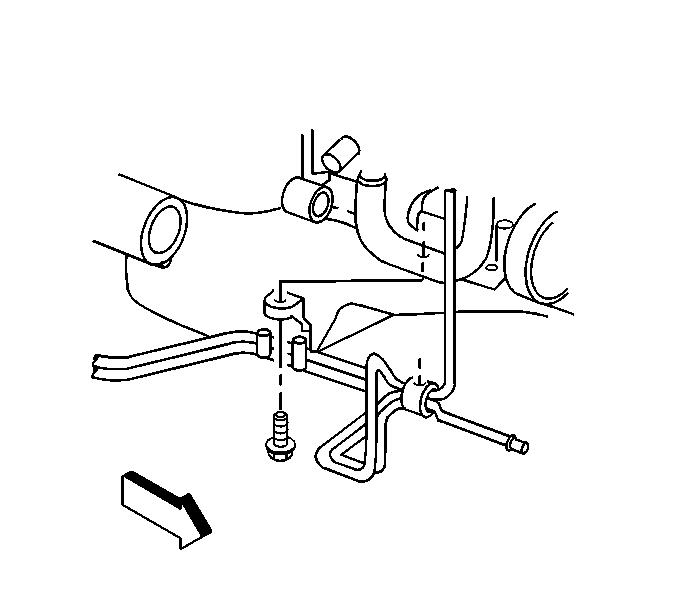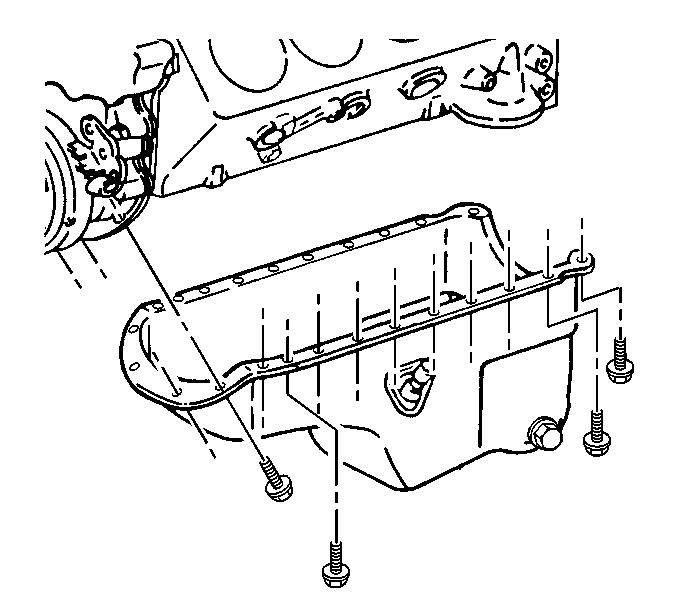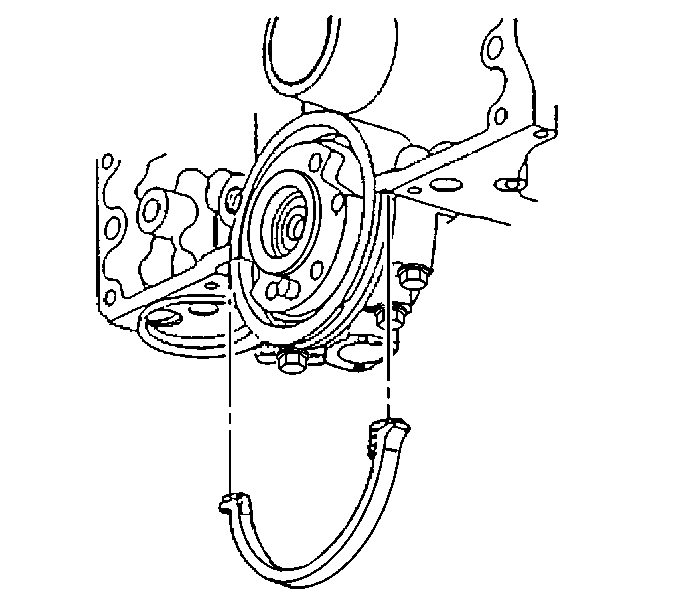Removal Procedure
Important: Do not raise the engine block by the crankshaft balancer to perform this service procedure. Damage to the crankshaft balancer or the crankshaft may occur.
- Disconnect both the battery negative cables from the batteries. Refer to Battery Replacement in Engine Electrical.
- Remove the oil level indicator and tube from the engine. Refer to Oil Level Indicator and Tube Replacement .
- Raise the vehicle and support with safety stands. Refer to Lifting and Jacking the Vehicle in General Information.
- Drain the engine oil.
- Secure transmission oil cooler line out of the way.
- Remove the flywheel from the crankshaft. Refer to Engine Flywheel Replacement .
- Remove the front differential carrier from the vehicle (four wheel drive vehicles only). Refer to Differential Carrier Assembly Replacement in Front Axle.
- Remove the transmission oil cooler lines from the retainer.
- Remove the oil pan from the engine block.
- Using a block of wood and a hammer, tap the side of the oil pan until seal is broken.
- Remove the rear seal on the from the oil pan.
- Clean the old RTV sealant from the oil pan and engine block.
- Clean all the oil and grease from the sealing surfaces.

Important: The transmission assembly does not have to be removed from the vehicle, if the vehicle is equipped with four wheel drive.

Important: Mark the engine oil pan bolt for the transmission oil cooler line retainer to ensure proper position.

Remove the oil pan bolts from the oil pan.

Installation Procedure
- Apply a 2 mm (1/16 in) bead of RTV sealant GM P/N 12345739 to the oil pan rear seal at the inside corners where the seal meets the rear crankshaft bearing cap on the engine block.
- Install the oil pan rear seal to the rear crankshaft bearing cap before the sealer starts to dry.
- Install the oil pan to the engine block.
- Install the oil pan bolts to the engine block in the following order.
- Tighten the two rear bolts to 17 N·m (23 lb ft).
- Tighten all the other bolts to 10 N·m (89 lb in).
- Secure the transmission oil cooler line in the retainer.
- Install the flywheel to the crankshaft. Refer to Engine Flywheel Replacement .
- Install the front differential carrier in the vehicle (4 wheel drive models only). Refer to Differential Carrier Assembly Replacement in Front Axle.
- Remove the safety stands and lower the vehicle. Refer to Lifting and Jacking the Vehicle in General Information.
- Install the oil level indictor and tube to the engine block. Refer to Oil Level Indicator and Tube Replacement .
- Fill the crankcase with engine oil. Refer to Approximate Fluid Capacities in Maintenance and Lubrication.
- Connect both the battery negative cables to the batteries. Refer to Battery Replacement in Engine Electrical.



Important: Make to reinstall the transmission oil cooler line retainer to the proper location.
Notice: Use the correct fastener in the correct location. Replacement fasteners must be the correct part number for that application. Fasteners requiring replacement or fasteners requiring the use of thread locking compound or sealant are identified in the service procedure. Do not use paints, lubricants, or corrosion inhibitors on fasteners or fastener joint surfaces unless specified. These coatings affect fastener torque and joint clamping force and may damage the fastener. Use the correct tightening sequence and specifications when installing fasteners in order to avoid damage to parts and systems.
Tighten

